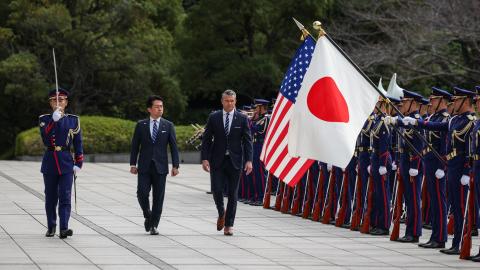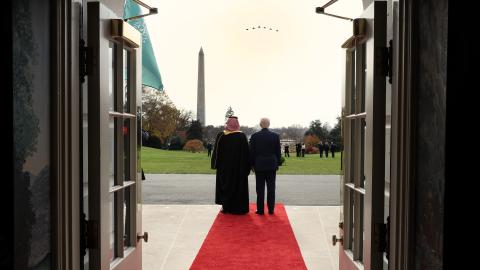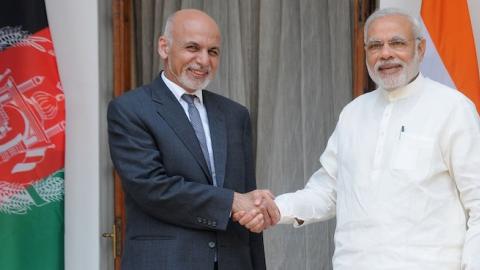After years of missing out on opportunities to shut down the Taliban insurgency and refusing to act against all Jihadi terrorist groups, Pakistan's fear of encirclement that led to its disastrous policies in Afghanistan might be on the verge of coming true. Since the withdrawal of Soviet forces in Afghanistan in 1989, Pakistan has supported some of the most hardline Islamist factions on grounds that it could not let Afghanistan fall into the hands of other foreign powers.
Now, it seems that it is precisely because of Pakistan's support of the Taliban and the Haqqani network that India, Afghanistan and the United States have agreed to strategically encircle Pakistan.
Afghanistan and the United States tried hard to persuade Pakistan, especially after 9/11, to work with them in ending the safe haven for terrorists that has made Pakistan the epicenter of global jihad in addition to being a major victim of terrorist attacks. Pakistan's paranoid security establishment, however, saw conspiracies between Afghan and Indians and Indians and Americans where there were none. After almost eight years of hoping that Pakistan would bring the Taliban and the Haqqani group to the negotiating table, the Obama administration has decided to signal that it is ready to consider options for Afghanistan that do not include Pakistan.
On August 30, 2016 India and the United States signed LEMOA (Logistics Exchange Memorandum of Agreement), one of three 'foundational agreements' that the US signs with countries with whom it has a close defense relationship.Afghanistan's Chief of Army Staff, Sher Mohammad Karimi, is currently on a four day visit to India seeking military assistance, both equipment and training.At the India-US Strategic Commercial dialogue in Delhi on August 29, 2016 Secretary of State John Kerry announced that in September the United States, India and Afghanistan will finally hold a trilateral dialogue.
On surface, these events are not directed specifically at Pakistan but to a paranoid Pakistani security establishment it appears like a nightmare come true.
Since independence in 1947, Pakistan's worldview has been shaped by an obsession with India. Pakistan has manifested a desire to escape an Indian (and by default a South Asian) identity and sought to be perceived as a Middle Eastern country. This led Pakistan into American-led middle-east centered military alliances, which were meant to help Pakistan secure U.S. equipment for its goal of being India's military equal.
The belief that India and Indian leaders have not accepted the idea of a Pakistan born out of British India's partition has led to the perception of India as an existential threat to Pakistan. Although there is no evidence that India seeks to reincorporate Pakistan, fear of undoing partition has informed Pakistani decision-making for 69 years.
Pakistan's strategists and policy makers have seen Afghanistan consistently through the prism of their fear of India. Fearful of an Indo-Afghan alliance that would have the potential of breaking up Pakistan, Islamabad has sought a pro-Pakistan, anti-Indian Afghan regime, especially after Pakistan's role as the staging ground for the anti-Soviet jihad in Afghanistan during the 1980s.
Afghanistan's periodic support for irredentist Pashtun (and later Baluch demands) has only strengthened this Pakistani paranoia. Pakistanis have feared a 'pincer' attack to undo Pakistan involving India and Afghanistan, notwithstanding the fact that during the India-Pakistan wars of 1965 and 1971, Kabul sided with Islamabad, not Delhi.
In recent years, Afghan leaders encouraged by the United States have repeatedly made attempts to build ties with Pakistan but their efforts have not been reciprocated. In 2011 former Afghan President Hamid Karzai referred to Pakistan as Afghanistan's twin brother while describing India only as 'a great friend.' Current President Ashraf Ghani spent the first two years of his presidency reaching out to Pakistan, expressing hope that Pakistan would rein in the Taliban operating from its soil.
Pakistan, however, has remained wedded to its fears and seems to have risked its alliance with the United States in pursuance of its assumptions about Afghanistan. Since 2001, Pakistan has assumed that it can return to be being the paramount power in Afghanistan once U.S. forces, which arrived in the aftermath of 9/11, leave the region. For their part, the Americans put up with Pakistan's failure to keep its promises about combating terrorism and seldom went beyond periodic reprimands to nudge Pakistan's policy in a different direction.
All that is beginning to change. Closer economic ties between India and the US are seen as providing New Delhi with the economic might to build its military power. The Americans are now unwilling to risk expanding ties with India for the sake of an increasingly unreliable Pakistan. Pakistan's response to close ties between the US and India is to argue that this will disturb the strategic imbalance in South Asia.
After years of deferring to that argument, Washington seems poised to finally ignore it.
Unable or unwilling to openly say that it fears India's rise and knows that it cannot play catch up, Pakistan's security establishment prefers to couch its words by referring to it as strategic imbalance. Pakistan's hope that the international community will step in and help create parity between India and Pakistan is becoming less and less attainable.
Always fearful of India and framing its foreign policy solely through the prism of the perceived existential threat, Pakistan has been unable to build effective partnerships with most countries in its neighborhood. Others are not always as interested as Pakistan in helping it escape India, seek parity with India or to contain India within the region.
Pakistan does not have good ties with the country it broke away from (India) nor with the country that broke away from it (Bangladesh). Pakistan's relations with its other western neighbor Iran are friction-ridden as well primarily because of Pakistan's use of Jihadis as levers of foreign policy. Iran suspects Pakistan of giving free rein to anti-Iran Sunni extremists in Balochistan, who also act as Pakistan's allies in fighting Baloch nationalists seeking separation or autonomy from Pakistan.
Pakistan could have been part of LEMOA had it not been identified by Afghanistan, India and the U.S. as part of the region's terrorism problem. Islamabad's zero sum games involving unending jihad have led to its nightmare of India-U.S.-Afghan partnership becoming a reality. Pakistan would benefit from accepting that it is a part of South Asia. Building closer economic and commercial relationships with its immediate neighbors will bolster Pakistan's economy and stabilize its polity and society. If, however, Pakistan's leaders stick to their national narrative of grievance against India, they will find that other countries now have less time for that than they might have had earlier.

















